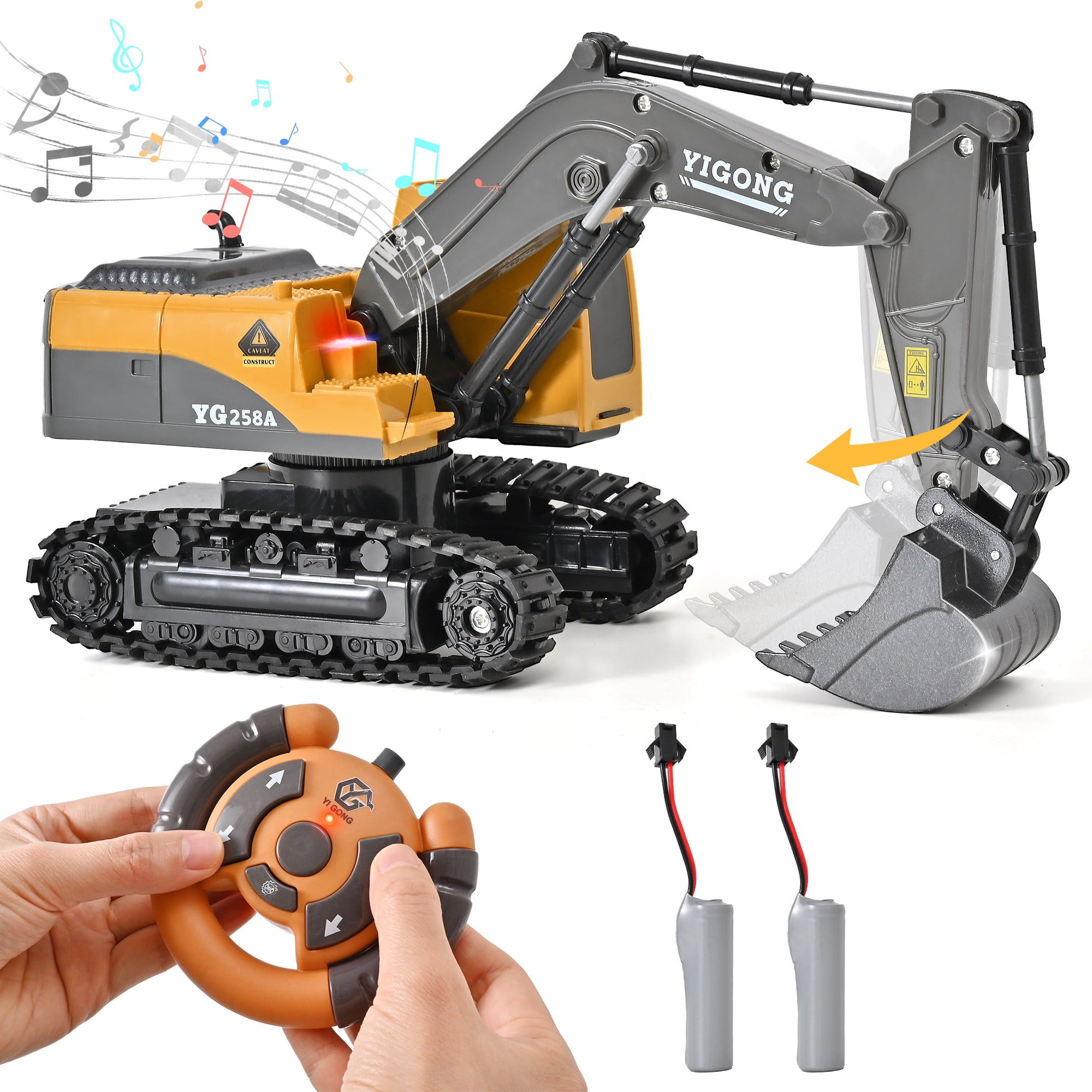Trends in rc excavator Technology to Watch in the Future
Wiki Article
Discover the Relevance of Excavator in Modern Building Projects
Excavators are essential tools in modern construction tasks. Their adaptability allows them to execute a vast array of jobs, from excavating and grading to demolition and website prep work. Advanced features, such as hydraulic add-ons and general practitioners, enhance their capacities and performance on job websites. As the sector progresses, the significance of excavators expands even a lot more. Understanding their duty can reveal insights into the future of building and construction techniques. What exists in advance for these devices?The Flexibility of Excavators in Various Projects
Excavators are frequently linked with large building and construction projects, their versatility enables them to be utilized in a broad array of applications, from property landscape design to energy maintenance. In urban settings, excavators can navigate limited spaces to dig structures for homes or install drainage systems. Their capacity to perform fragile jobs makes them optimal for landscape design jobs, where they can excavate for ponds or plant trees. On top of that, excavators play a necessary role in energy upkeep, efficiently excavating trenches for pipes or cable televisions without interfering with bordering locations. In farming applications, they aid in land clearing up and soil prep work. Their versatility enables them to be geared up with different add-ons, boosting their functionality across various tasks. This multifaceted nature of excavators not only enhances various building and construction processes yet likewise demonstrates their important duty in modern infrastructure growth and upkeep.Secret Functions and Sorts Of Excavators
The discussion on key attributes and types of excavators highlights the important qualities that make these devices vital in building. Numerous excavator types, each developed for particular tasks, show their adaptability and effectiveness throughout different applications. rc excavator. Recognizing these features and categories is essential for enhancing their usage in contemporary construction projectsExcavator Keys In Overview
Excavators play a pivotal function in modern-day construction, using convenience and efficiency across different tasks. These heavy machinery devices can be found in several types, each tailored for particular applications. One of the most common kinds consist of crawler excavators, known for their stability on uneven terrain, and wheeled excavators, which supply better mobility on smooth surfaces. Miniature excavators are favored for small tasks and tight areas, while long-reach excavators are created for deep digging. In addition, there are specialized excavators, such as hydraulic excavators, which enhance power and precision. Each kind includes special abilities, making them important for jobs varying from digging and grading to demolition and material handling. Recognizing these variations permits construction specialists to select the best excavator for their task needs.Trick Includes Explained
Recognizing the essential features of excavators boosts their reliable application in construction tasks. Excavators are defined by their powerful hydraulic systems, which supply the needed pressure for digging, training, and relocating products. Their expressed arms permit a large array of activity, promoting precise procedures in restricted spaces. Furthermore, the selection of add-ons, such as buckets, grapples, and augers, broadens their flexibility to fulfill various job demands. The size and weight of excavators additionally contribute to their stability and maneuverability on different terrains. Moreover, improvements in innovation have actually led to the combination of general practitioner and automation, improving precision and effectiveness in excavation jobs. These features jointly place excavators as vital devices in modern building and construction.Applications in Construction
Changing construction sites, excavators play a critical duty across various applications, varying from residential structure tasks to large-scale framework growths. These functional equipments are outfitted for jobs such as excavating foundations, trenching for energies, and site grading. Various types of excavators, including spider, wheeled, and mini excavators, provide specific advantages customized to the job requirements. Crawler excavators master harsh surfaces, while rolled excavators provide flexibility on smooth surface areas. Small excavators are optimal for constrained spaces, making them prominent in urban settings. The performance and power of excavators substantially accelerate building and construction procedures, ensuring prompt job conclusion. Their versatility additionally boosts their value, permitting building and construction teams to take on a varied array of difficulties effectively.Enhancing Efficiency and Efficiency on Work Sites
Making best use of performance and productivity on work sites is an important goal in modern construction. Excavators play a crucial duty in accomplishing this objective by simplifying different tasks. Their ability to execute numerous functions-- such as digging, grading, and training-- decreases the requirement for extra tools, therefore saving time and resources.Moreover, excavators enhance workflow by permitting faster conclusion of projects. With sophisticated features like hydraulic attachments and GPS innovation, they can execute precise procedures that minimize errors and remodel. This precision not just enhances the quality of work but additionally optimizes material use, adding to set you back savings.The adaptability of excavators allows them to adjust to various website problems, guaranteeing that jobs progress efficiently no matter difficulties. By incorporating excavators right into building processes, teams can significantly boost their general efficiency, bring about timely job completion and enhanced productivity.Safety And Security Benefits of Making Use Of Excavators
Excavators substantially enhance safety on building and construction sites through enhanced driver presence and decreased manual work risks. By giving drivers with a clear sight of their environments, excavators assist to stop injuries and accidents. Additionally, the equipment minimizes the requirement for workers to involve in unsafe hands-on jobs, further promoting a safer workplace.Enhanced Driver Exposure
Building and construction websites can be chaotic and filled up with potential threats, enhanced operator visibility plays a vital duty in making sure safety when utilizing excavators. Modern excavators are created with huge, unhampered home windows and purposefully placed mirrors, permitting operators to preserve a clear view of their surroundings (rc excavator). This boosted presence is vital for identifying pedestrians, various other machinery, and different barriers, significantly reducing the risk of crashes. Furthermore, lots of excavators integrate advanced innovation, such as cams and sensing units, to give operators with added viewpoints, even more boosting awareness. The capability to see even more clearly not only help in reliable operation however likewise promotes a safer job atmosphere, making it much easier for operators to navigate complicated building sites without endangering security criteriaReduced Guidebook Labor Dangers
When manual work is reduced with making use of excavators, many security advantages emerge, noticeably improving the health of construction workers. Excavators decrease the physical stress connected with hefty lifting and recurring tasks, properly reducing the risk of bone and joint injuries. By automating procedures such as digging, grading, and relocating products, they permit workers to keep a safer range from prospective risks. In addition, excavators are geared up with sophisticated safety functions, such as rollover investigate this site protection systems and improved operator functional designs, which further guard workers on site. The result is a substantial reduction in workplace accidents and injuries, resulting additional reading in increased productivity and morale among building teams. Ultimately, the adoption of excavators adds to a more secure and more efficient building and construction setting.Excavators in Earthmoving and Website Preparation
In modern building, a considerable portion of earthmoving and site preparation jobs counts on the effectiveness and versatility of excavators. These equipments are designed to take care of various soil kinds and surface, making them vital for grading, excavating, and trenching activities. Their hydraulic arms can be equipped with various accessories, such as augers and containers, enabling drivers to customize their technique based upon specific job requirements.Excavators excel at relocating huge volumes of planet rapidly and successfully, which increases the general building and construction timeline. They can browse limited spaces and challenging websites where traditional devices might battle, enhancing efficiency. Additionally, the accuracy of excavators assurances that website preparation sticks to rigorous specifications, lessening the danger of errors that could result in expensive rework.The Role of Excavators in Demolition Tasks
Excavators play an important role in demolition tasks, as they possess the power and dexterity required to take apart frameworks effectively. Equipped with various add-ons such as hydraulic breakers, shears, and grapples, these makers can adapt to various demolition requirements, whether for tiny structures or large commercial sites. Their adaptability allows operators to tackle complicated jobs while keeping safety and precision.In enhancement to their demolition abilities, excavators assist in debris elimination, making sure that work sites stay well organized and secure. By breaking down structures into convenient pieces, they allow for structured cleaning and recycling of materials, straightening with modern sustainability efforts.Moreover, excavators can access limited rooms and navigate uneven surface, making them indispensable in urban demolition jobs. In general, their robust layout and multifunctionality make excavators a critical asset in the demolition stage of building, adding substantially to job timelines and efficiency.

Future Patterns in Excavator Innovation and Usage
As the building and construction sector progresses, innovations in excavator innovation are poised to change their usage and performance noticeably. One significant fad is the assimilation of automation and expert system, permitting excavators to run with very little human treatment. This shift will certainly improve accuracy in jobs such as grading and trenching, reducing human mistake and boosting productivity.Additionally, the surge of hybrid and electric excavators is forming a much more sustainable building atmosphere, reducing carbon discharges and gas costs. Improved telematics systems are additionally arising, allowing real-time monitoring of machine performance and upkeep requirements, which can result in far better functional performance and longer equipment lifespan.Moreover, developments in add-on innovation are increasing the adaptability of excavators, enabling them to do a broader variety of jobs. The mix of these patterns shows a future where excavators are smarter, greener, and a lot more adaptable, eventually improving building task characteristics.
Frequently Asked Concerns
Just How Do Excavators Contrast to Various Other Building Equipment?
Excavators, characterized by their convenience and power, excel in excavating and earthmoving compared to various other machinery. Their capability to do various jobs, consisting of training and demolition, makes them indispensable in construction tasks, boosting total performance.
What Is the Typical Lifespan of an Excavator?
The average lifespan of an excavator typically ranges from 7,000 to 10,000 operating hours, depending on upkeep, use conditions, and version. Correct treatment can expand this lifespan, making sure peak Check Out Your URL efficiency throughout its functional years.How Are Excavators Maintained for Ideal Performance?
Excavators need routine upkeep for peak efficiency, including regular inspections, liquid checks, filter substitutes, and prompt repair services. Carrying out a preventative maintenance routine assists lengthen their life-span and assurances effective procedure in different building atmospheres.What Are the Costs Connected With Renting Out vs. Purchasing an Excavator?
The prices connected with renting out versus buying an excavator differ substantially. Renting offers reduced upfront costs yet can gather with time, while purchasing calls for a considerable preliminary investment, however provides lasting savings and possession possession benefits.What Training Is Called For to Operate an Excavator?
Operating an excavator requires specialized training, typically consisting of safety methods, equipment operation strategies, and ecological recognition. Qualification programs often mandate practical experience, allowing operators to deal with various jobs efficiently while making certain conformity with market guidelines. The most typical kinds consist of spider excavators, known for their stability on unequal surface, and wheeled excavators, which provide better mobility on paved surfaces. Small excavators are favored for limited spaces and small tasks, while long-reach excavators are designed for deep digging. In addition, there are specialized excavators, such as hydraulic excavators, which improve power and accuracy. Different types of excavators, consisting of spider, wheeled, and mini excavators, supply particular advantages customized to the job demands. Spider excavators excel in rough terrains, while rolled excavators provide mobility on paved surface areas.Report this wiki page